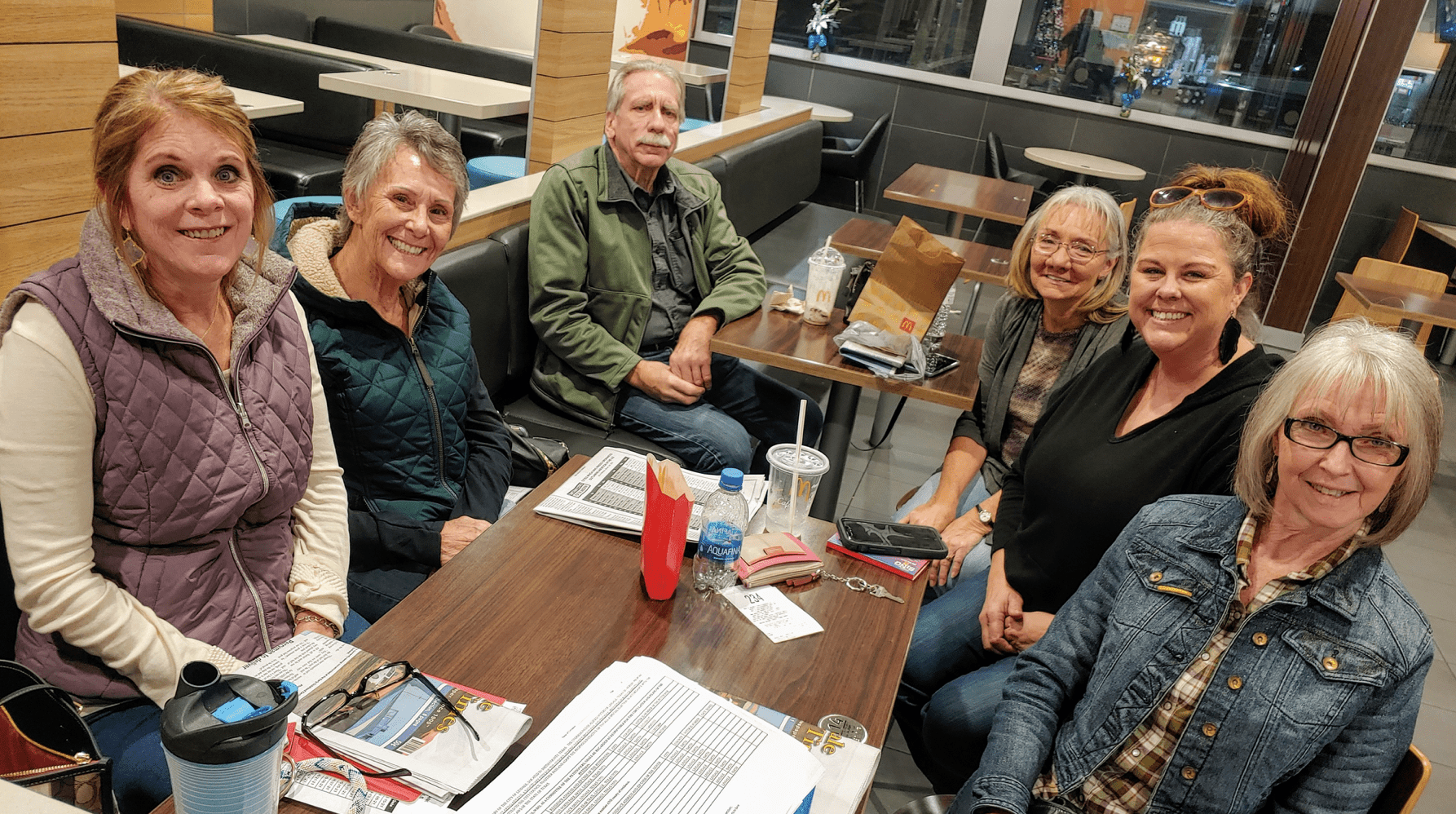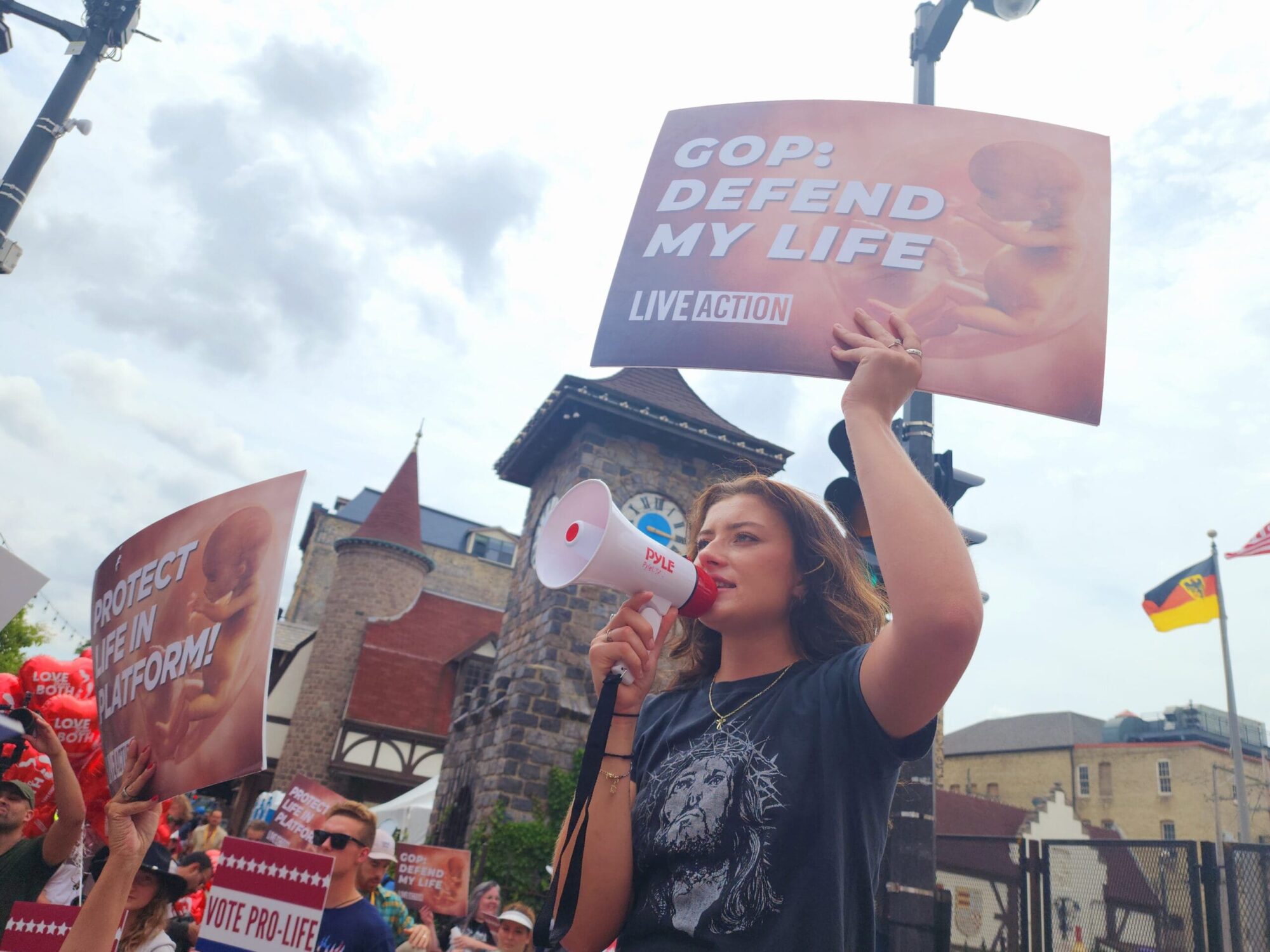Two years ago, on January 7, 2020, citizens of the City of Lindale (pop. 6,730) approached their conservative East Texas city council with a simple ask: outlaw abortion in Lindale, Texas. Citizens returned before their city council on January 21 and February 4, and their city council reached a decision on February 18.
At that time, only 12 cities had passed ordinances outlawing abortion (most of which were in East Texas). The cities that had passed the ordinance included Waskom (pop. 2,189), Omaha (pop. 1,021), Naples (pop. 1,378), Joaquin (pop. 850), Tenaha (pop. 1,160), Gilmer (pop. 5,216), Westbrook (pop. 312), Rusk (pop. 5,618), Colorado City (pop. 4,146), Gary (pop. 311), Big Spring (pop. 28,862), and Wells (pop. 769).
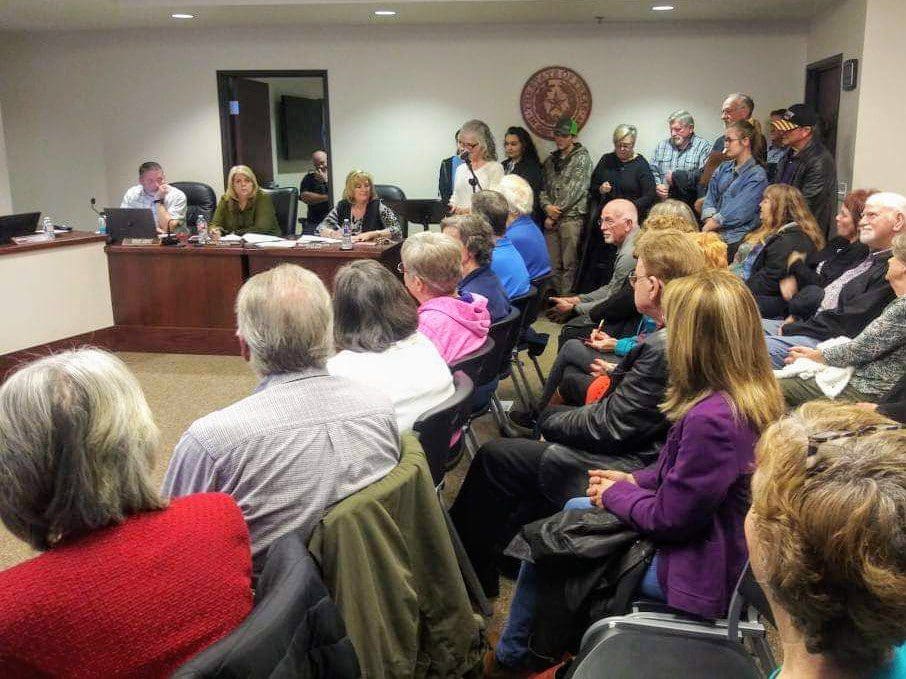
Residents address their city council in a packed council chambers on January 21, 2020, encouraging their leaders to outlaw abortion.
No lawsuit had been filed against any of the 12 cities, but an absence of lawsuits did not satisfy Lindale’s city attorney. Attorney Glen Patrick came out to address the citizens of Lindale the night of February 18, 2020. He asked, “Does the city do an ordinance that really isn’t an ordinance because it has no enforcement provisions, or do you do a resolution that clearly says what the people of Lindale say?” Patrick told the citizens of Lindale that what they really wanted was a resolution and not an ordinance, calling the ordinance “unconstitutional,” “unenforceable,” and “poorly worded.”
By night’s end, the Lindale City Council had rejected its citizens’ request to pass an enforceable ordinance outlawing abortion. Instead, the council passed a non-binding resolution condemning abortion, something the citizens of Lindale never asked for.
The citizens were crushed, and the vote against the ordinance made front-page news in the Tyler Morning Telegraph and was covered in both The Texan and The New York Times.
About a week after the council decided against outlawing abortion, the ACLU filed a lawsuit against seven of the 12 cities that had passed ordinances outlawing abortion. The cities named in the lawsuit included Waskom (pop. 2,190), Naples (pop. 1,378), Joaquin (pop. 850), Tenaha (pop. 1,160), Rusk (pop. 5,618), Gary (pop. 311), and Wells (pop. 769). The lawsuit lasted about three months and resulted in the ACLU withdrawing their lawsuit with the abortion bans passed by the cities remaining intact. All seven of the cities that were sued were represented at no cost to the city or taxpayers by attorney Jonathan F. Mitchell, the former Texas solicitor general.
Since then, 31 cities across the United States have passed ordinances outlawing abortion, with 27 of those cities being in the State of Texas.
Perhaps the most influential of all of these cities to the Lindale effort was Lubbock, which was the only city whose ordinance was passed by the citizens of their community instead of the mayor and city council. On May 1, 2021, the City of Lubbock outlawed abortion in a landslide election, with 62 percent in favor and 38 percent against.
Just four nights after the historic election, Lindale resident Janna Moore signed the online petition on the Sanctuary Cities for the Unborn website, once again expressing her desire to see abortion outlawed in her city. Moore wrote, “Abortion is murder of the unborn. We should do as much as possible to save their lives. They don’t have a voice, so we will cry out for them.”
Then came the news about the City of Lubbock. On May 17, the ACLU, representing Planned Parenthood of Greater Texas, filed a lawsuit against the City of Lubbock. While 25 other cities in Texas had outlawed abortion at the time of the lawsuit, Lubbock was different. The City of Lubbock was the only city to have outlawed abortion while having an active licensed abortion facility. The lawsuit lasted about two weeks and resulted in the United States District Court for the Northern District of Texas ruling against Planned Parenthood, in favor of the City of Lubbock. Because of the Lubbock ordinance, no abortions have been performed at Planned Parenthood in Lubbock since June 1, 2021, when the enforceable ordinance went into effect. The Lubbock ordinance made history, as it was the first law of its kind to successfully end abortion in a city where abortions were being performed.
More Lindale residents started to question why their city was not among one of the many Sanctuary Cities for the Unborn across Texas. On September 1, 2021, the Texas Heartbeat Act went into effect, making it illegal to perform an abortion on any child with a detectable heartbeat. When the news started to spread about the origins of the Texas Heartbeat Act, many in Lindale were shocked and upset that their city had chosen not to be a part of the movement. The success of the Texas Heartbeat Act’s private enforcement mechanism before the United States Supreme Court only further solidified their position. Despite what the city attorney had said in February 2020, a “non-binding resolution” was not what the people of Lindale really wanted—they wanted a law outlawing abortion.
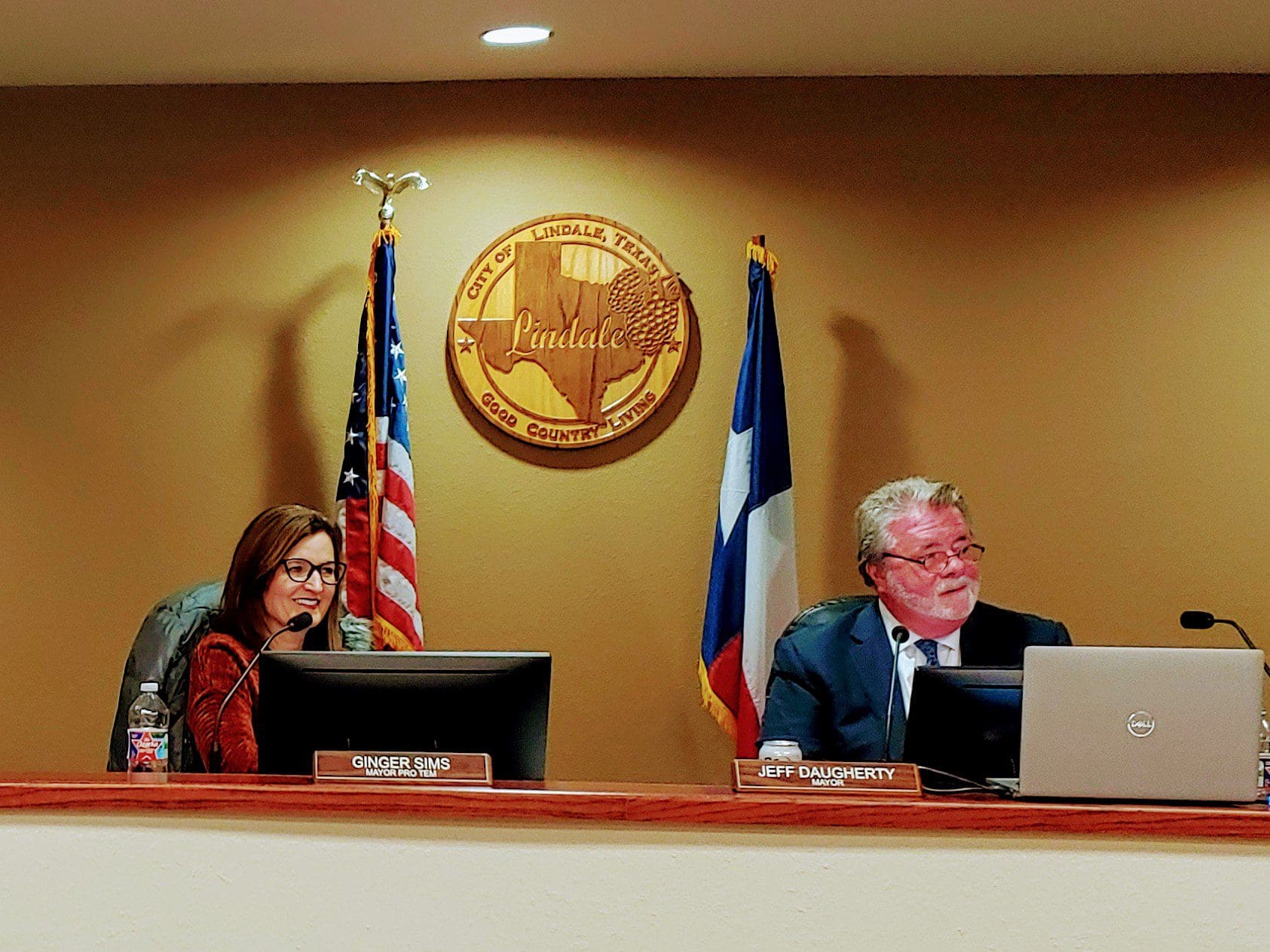
Lindale Mayor Pro-Tem Ginger Sims and Mayor Jeff Daugherty listen to residents during the January 4, 2022, meeting of the Lindale City Council.
Two years after the citizens of Lindale first addressed their city council about outlawing abortion, they returned to once again ask for abortion to be outlawed in Lindale, Texas. Citizens expected the response would be different, especially since City Attorney Glen Patrick’s arguments had not aged well. Word had spread across Lindale, and residents packed city hall. To their surprise, the mayor appeared to be irritated with their presence. It was announced that only Lindale residents would be allowed to speak during the public comment portion of the meeting; even then, not everyone would be allowed to speak. Some residents even waited until the very end of the meeting to see if the mayor or council members gave any indication of revisiting the issue in the near future. Hearing no such indication, many of the residents left the meeting feeling discouraged, but far from defeated.
While Lindale residents Janna Moore, Carole Rapp, Lynn Walters, and Tesha Marsh had previously discussed the possibility of an initiative petition, the decision was made after the council meeting to start the process provided by the Lindale City Charter. According to the charter, “Any initiative ordinance may be submitted to the Council by a petition signed by currently qualified voters of the City equal in number to at least 15% of the total number of the qualified voters registered to vote at the last regular municipal election.” The Smith County Board of Elections has reported a total of 4,091 qualified voters registered to vote in the City of Lindale at the time of the last regular municipal election in May 2021. Based on this number, the Committee of Petitioners will need to obtain no less than 614 qualified signatures from the registered voters who live within city limits.
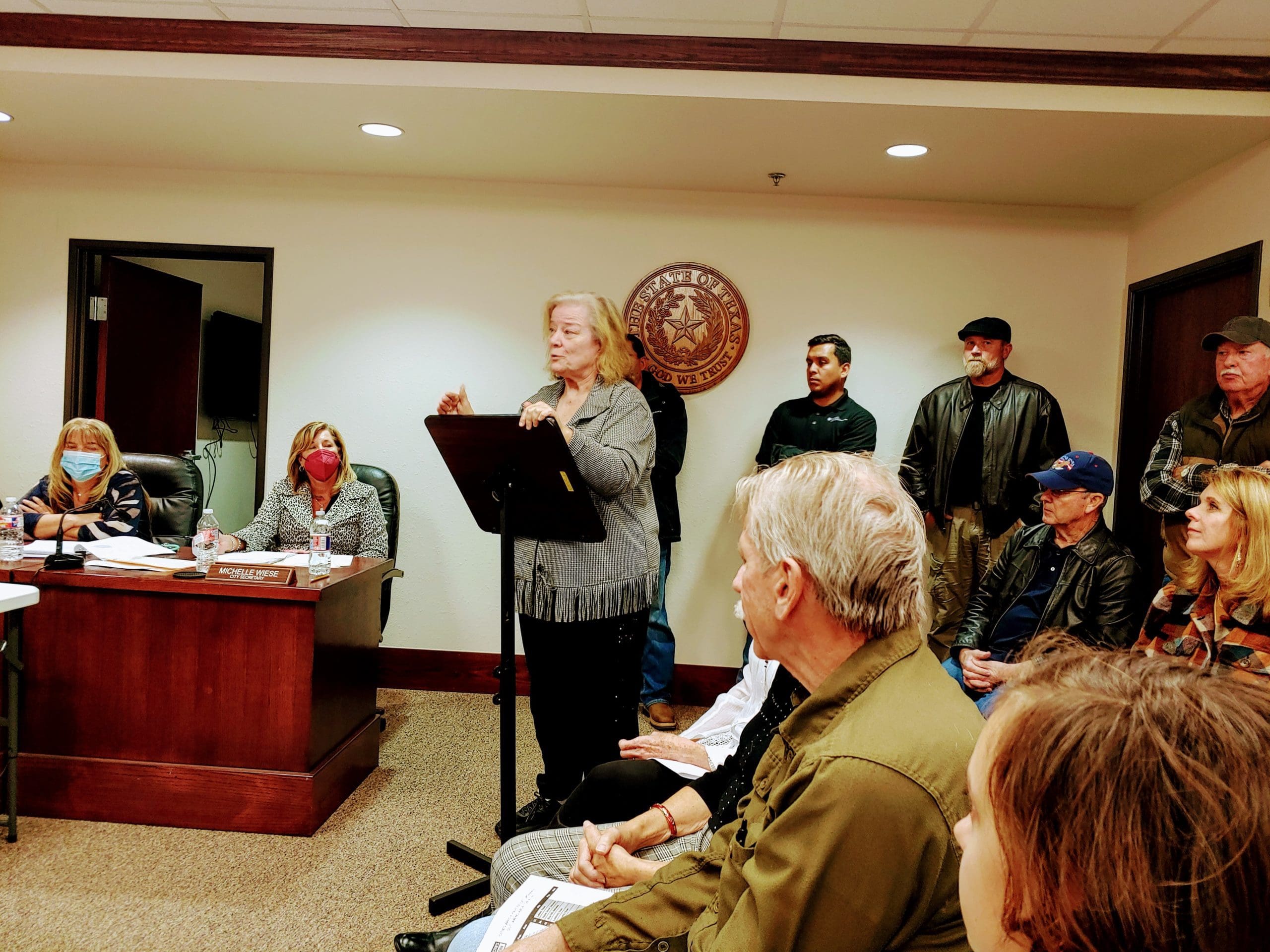
Lindale resident Carole Rapp speaks before the Lindale City Council during the January 4, 2022, meeting.
The Committee of Petitioners, led by Janna Moore, intend to collect well over the required 614 signatures needed to force the Lindale City Council to either adopt the ordinance in the exact form proposed, or for the ordinance to be placed on the ballot for the next available election.
If passed, the Lindale ordinance would immediately outlaw abortion within city limits. The ordinance states, “It shall be unlawful for any person to procure or perform an abortion of any type and at any stage of pregnancy in the city of Lindale, Texas,” and, “It shall be unlawful for any person to knowingly aid or abet an abortion that occurs in the city of Lindale, Texas.” Abortion is defined by the ordinance as “the act of using or prescribing an instrument, a drug, a medicine, or any other substance, device, or means with the intent to cause the death of an unborn child of a woman known to be pregnant.”

Pastor Steven Charles of Bethesda Church speaks before the Lindale City Council during the January 4, 2022, meeting.
In addition to outlawing abortion, the Lindale ordinance also declares abortion-inducing drugs to be contraband, stating, “It shall be unlawful for any person to possess or distribute abortion-inducing drugs in the city of Lindale, Texas.” The ordinance defines abortion-inducing drugs as “mifepristone, misoprostol, and any drug or medication that is used to terminate the life of an unborn child.”
Out of the 43 cities that have passed ordinances outlawing abortion, the City of Lubbock is the only city to pass its ordinance through a citywide election. Outside of Lindale, the only other cities whose residents are attempting to outlaw abortion through ballot initiative are San Angelo (population 101,612), whose residents began the citizen initiative process on November 18, 2021, and Abilene (pop. 124,407), who began their citizen initiative process on December 3, 2021.
Since June 11, 2019, a total of 39 cities in Texas have passed enforceable ordinances outlawing abortion within their city limits.
This is a commentary published with the author’s permission. If you wish to submit a commentary to Texas Scorecard, please submit your article to submission@texasscorecard.com.
